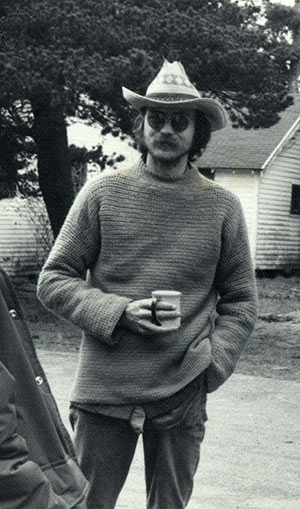Poker Face Smile
Author: Robert Force
Date/Studio: 1978 Kaye-Smith, Seattle, WA
Engineer: Dave Mathew
Producer: Bill Tootell
Original Release: Crossover (KM308)
Current Release: The Complete Recordings (BSR 158)
 The first time I recorded this tune was as a solo on the Pacific Rim Dulcimer Project. More of its history can be read in that description. The second time I recorded it was in 1978 at Kaye-Smith studios in Seattle, Bill Tootell producing. Bill's playing in the jazz-influenced group, Solitaire, led him to bring in Ted Brancato to play a sweeping grand piano accompaniment on the Crossover version.
The first time I recorded this tune was as a solo on the Pacific Rim Dulcimer Project. More of its history can be read in that description. The second time I recorded it was in 1978 at Kaye-Smith studios in Seattle, Bill Tootell producing. Bill's playing in the jazz-influenced group, Solitaire, led him to bring in Ted Brancato to play a sweeping grand piano accompaniment on the Crossover version.
By then the tune had been part of Al's and my repertoire for nearly four years. We had lots of other songs we could have included but, like a lot of the choices we made to be on Crossover, we thought we needed to do our own roots music. We were still in the 70s in terms of our playing style while the world was slowly moving into the 80s, away from the soul-searching type of lyrics found in this tune.
After losing all of Janette's money in a poker game with the loggers and fisherman of Aberdeen, WA all that was left from that evening of come-uppance was this song on a napkin. All of our money meant thirty-five dollars, but the amount is relative; we lived in a place where we had no income except for her unemployment check. All was all. If there ever was a time for us both to look at our commitment to be (and stay) together, that was certainly one of them.
I vowed I would sing this song until I got the money back. It became sort of a quest-- a way to remind myself to be in the now instead of trying to get somewhere else. There is no doubt I was a dyed-in-the-wool hippie of that time and place in America. I believed we were on the planet to find truth and to share that truth with others. What I found playing cards that night in Aberdeen was there are people in the world who are always looking for the big score to bail them out. That night I was one of them.
I also discovered that within myself was a child who believed in miracles, higher paths and callings-- a child who was not content to be living anyone else's lies (or lives). That may be a bit heavy-handed but it was truly an age of hyperbole. The hippies (we) took no prisoners in the naming of inconvenient truths, doubly so if it was one we ourselves were stumbling over.
The song was also a self-admonition as well as a self-affirmation: “After you've played Life's one last card the way down that road won't seem quite so hard when you turn your back on bright lights and bars and open yourself to what you are-- child of morning with tomorrow's eyes, child of living nobody's lies, child of laughter with nothing to hide, child of living the beauty inside.” The future was a desirable, hopeful place. Our job, my job, was to pay attention and to not get side-tracked.
The writings and sayings of Baba Ram Dass were all the rage back then. His easy-to-understand pop-spirituality was a panacea for nearly everything. His extremely popular and widely read book, Be Here Now, was the quintessential ingredient of tens of thousands of lives in that tumultuous time. We were a generation looking for a way to define ourselves with often painful honesty in the greater context of spirituality, equality, right action and right livelihood.
Some chose living lightly and going back to the land. Others chose political action. Some chose ashrams, throwing themselves at the feet of perceived masters. We consciously chose to make a difference somehow in the daily living of our lives. My trip to the card parlor was a betrayal of those beliefs. I had stepped off of my own path. It would “take a lot of notes to pay for that game-- take a lot of music to make me sane.” That's what I chose.
I write this at age 65 with the vantage of being able to look back at that kid of 40 years ago. He wrote a good song. He opened (and crawled through) a window into a world where personal choices matter.
